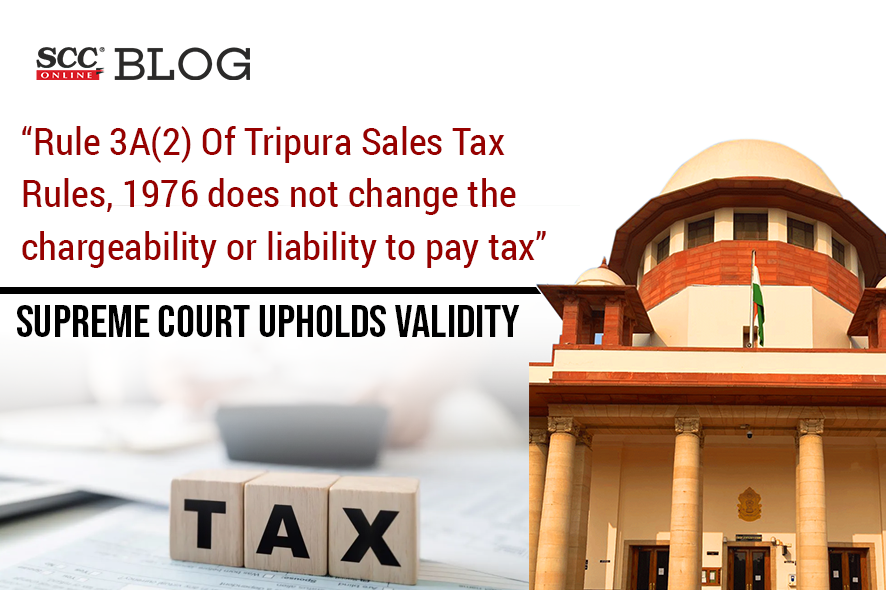Supreme Court: In a Civil Appeal challenging the common judgment and order passed by the Division Bench of Gauhati High Court upholding the decision of Single Judge declaring Rule 3A(2) of the Tripura Sales Tax Rules, 1976 (‘TST Rules’) ultra vires to Tripura Sales Tax Act, 1976 (‘TST Act’), the Division Bench of M.R. Shah and Krishna Murari, JJ. found the High Court’s decision ‘absolutely fallacious’, quashed and set aside the judgment and order of both the Benches of High Court along with the quashing of memorandum of 1992 issued by the State Revenue Department.
The present appeal challenges the common judgment and order passed by the Division Bench of Gauhati High Court on 29-8-2007 dismissing the writ appeals by State against the judgment and order passed by Single Judge which declared the Rule 3A(2) of the TST Rules ultra vires to TST Act. The Division Bench had also set aside the part of Single Judge judgment holding the original writ petitioners liable under Section 3AA of the TST Act.
The Court looked into the facts wherein the Revenue Department of Tripura issued a memorandum in 1992 for deduction of 4% tax at source under Section 3-A of the TST Act. Tender notices were issued for hiring vehicles, work orders were issued in favour of original writ petitioners and agreements were entered into with GAIL, ONGC, FCI, etc. The original writ petitioners being the vehicle suppliers filed a Writ Petition before the High Court challenging the vires of Rule 3A(2) of TST Rules and for refund of amount deducted on the ground that there is no charging provision under TST Act for levy of tax on transfer of right to use goods. Another ground to challenge Rule 3A was that it suffers from absence of delegation of power invalidating the memorandum issued in 1992.
The Single Judge of High Court declared the Rule 3A(2) as ultra vires but held the original writ petitioners liable to pay sales tax under Section 3AA. The decision was challenged by both the parties before the Division Bench. The State challenged the ultra vires part, while the original writ petitioners challenged the liability for payment of sales tax. The Division Bench dismissed the State appeals and allowed the one by original writ petitioners holding Rule 3A(2) ultra vires of TST Act and Rules and relieving them from tax liability under Section 3AA of TST Act. The present appeal has been filed being aggrieved by the said judgment and order passed by the Division Bench.
The Court considered the question of whether Rule 3A(2) of the TST Rules can be declared ultra vires being contrary to the provisions of the ‘TST Act’, though there is express proviso in Section 3(1) for levy of 4% Sales Tax on any transfer of the right to use any goods for any purpose.
The Court examined various provisions of the TST Act and Rules and observed that on combine reading of Section 3 with Section 2(b) & 2(g) of TST Act, any transfer of right to use any goods shall be deemed to be a ‘sale’, and the transferor of the right to use any goods/vehicles can be said to be a dealer liable to pay tax at the rate of 4% as per Section 3(1) of TST Act. Thus, the Court rejected the submissions of original writ petitioners negating the sale or transfer of goods since they are unregistered as per TST Act not liable to pay 4% tax. The Court held that the liability to pay the tax shall be on the transferer transferring the right to use any goods as per proviso to Section 3(1) read with Section 2(b) and 2(g) of TST Act.
While considering the question of whether Rule 3A(2) of the TST Rules and memorandum issued by the Government for deduction of tax at 4% and bills to be paid to the transferers are ultra vires to TST Act, the Court found the High Court’s view ‘absolutely fallacious’. The Court clarified that “Rule 3A(2) only provides for a machinery/mechanism where the person buying the goods is required to deduct the tax at source and deposits the same with the Revenue. It does not in any manner change the chargeability of the tax or liability of the tax which is under Section 3(1) of the TST Act read with Section 2(b) & 2(g) of the TST Act.”
The Court observed that the said rules are framed by the State while exercising the rule-making power under Section 44 of TST Act and the tax liability on transfer of right to use the goods shall still be continued under proviso to Section 3(1). The Court said that merely providing the mode or machinery/mechanism for recovery of tax payable by the transferer/supplier from buyer deducting the tax at source and depositing the same with Revenue cannot be said to be ultra vires to TST Act and Rules.
The Court quashed and set aside the common judgment and order passed by the Single Judge and Division Bench of the High Court declaring Rule 3A(2) of TST Rules ultra vires to TST Act, in addition to quashing and setting aside the State memorandum of 1992 requiring the hirers to deduct an amount of tax at 4%.
The Court further observed and held that Rule 3A(2) of TST Rules does not change the chargeability or liability of tax in any manner. The Court commented that “the High Court has fallen in error in misinterpreting Rule 3A(2) of the TST Rules and declaring the same ultra vires to TST Act. The High Court materially erred in quashing and setting aside the memorandum issued by State Government.”
[State of Tripura v. Chandan Deb, 2023 SCC OnLine SC 327, judgment dated 24-3-2023]
Judgment authored by: Justice M.R. Shah







